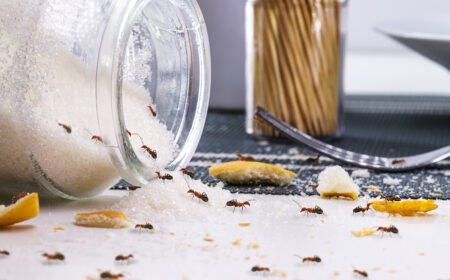Sugar ants are tiny but determined and often cause trouble in kitchens, especially where crumbs or spills are left behind. They love sugary or sweet things, and it can be tough to keep them away once they find a way in. A small sugar ant problem can quickly get out of hand if not dealt with.
Knowing how to get rid of these ants and stop them from returning is important for keeping your kitchen clean and free of ants. From cleaning routines to specific treatments, there are straightforward actions you can take to regain control of your space.
Here is how to get rid of sugar ants in the kitchen:
Identify the Source of the Infestation

To start dealing with sugar ants, find out where they get in. These tiny pests often come through cracks in walls, windows, or floors. Check the kitchen for spots they might be entering and look for ant trails near food storage or garbage bins.
Once you find their route, it’s easier to see what draws them in. Food crumbs, spilled drinks, or unsealed pantry items can attract them. Tackling the source makes your efforts more focused and effective.
Keep Your Kitchen Spotlessly Clean
Keeping your kitchen clean can deter sugar ants. Since they’re always looking for food and water, cutting off their supply makes a big difference. Start by wiping down the counters, cleaning up spills immediately, and sweeping the floors often.
Remember to seal garbage bags tightly and take them out regularly since lingering food smells can draw ants in. Even tiny crumbs or sticky spots left behind in hidden areas like under appliances or along baseboards can become a meal. Doing these things makes your space less appealing to sugar ants.
Seal Entry Points to Block Ant Access

Sugar ants are skilled at finding tiny openings to enter your home. To prevent them, use caulk to seal cracks along windows, doors, and baseboards. This easy fix can greatly reduce their entry points.
Also, check for gaps around pipes and vents where ants might sneak through. Using weatherstripping or door sweeps can keep them out. Sealing these spots helps with sugar ants and stops other pests from getting in.
Use Natural Deterrents
Natural remedies can work well to deter sugar ants. Vinegar, lemon juice, and essential oils can mess up their scent paths, making it tricky for them to find their way. Spraying diluted vinegar or lemon juice around baseboards, windowsills, and other entry spots can be a barrier they’ll avoid.
Trying essential oils like peppermint or tea tree oil is a good idea, too. Mix a few drops with water and spray it where ants are busy. These natural fixes are safe in kitchens and won’t harm your family or pets.
Targeted Pest Control Solutions

You might need to look into ant-specific pest control methods if you have a big ant problem. Traps or baits can reduce their numbers by going after the whole colony and not just the worker ants. These solutions work by luring ants to bring the bait back to their homes, where it can deal with the source of the issue.
Calling professional pest control services could be another option if the ants keep returning. They offer custom solutions to handle tough infestations and ensure food preparation areas stay safe. Talking to an expert might be the best way to get long-term results.
Store Food Properly
Storing food improperly can lead to sugar ant problems. Keep pantry basics like sugar, flour, and cereal in airtight containers. This will prevent ants and keep your ingredients fresh.
Even pet food can draw ants, so store it in sealed bins and only leave out what’s needed at feeding times. Making food hard to reach discourages sugar ants from entering your kitchen.
Regular Maintenance to Prevent Recurrence
If you don’t store food properly, you might attract sugar ants. Keep things like sugar, flour, and cereal in sealed containers. This helps keep ants away and your ingredients fresh.
Even pet food can attract ants. Store it in sealed bins and only put out what your pet needs when it’s time to eat. By making food hard for ants to reach, you help keep them out of your kitchen.









